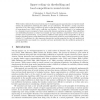Free Online Productivity Tools
i2Speak
i2Symbol
i2OCR
iTex2Img
iWeb2Print
iWeb2Shot
i2Type
iPdf2Split
iPdf2Merge
i2Bopomofo
i2Arabic
i2Style
i2Image
i2PDF
iLatex2Rtf
Sci2ools
122
Voted
NECO
2008
2008
Sparse Coding via Thresholding and Local Competition in Neural Circuits
While evidence indicates that neural systems may be employing sparse approximations to represent sensed stimuli, the mechanisms underlying this ability are not understood. We describe a locally competitive algorithm (LCA) that solves a collection of sparse coding principles minimizing a weighted combination of mean-squared error (MSE) and a coefficient cost function. LCAs are designed to be implemented in a dynamical system composed of many neuron-like elements operating in parallel. These algorithms use thresholding functions to induce local (usually one-way) inhibitory competitions between nodes to produce sparse representations. LCAs produce coefficients with sparsity levels comparable to the most popular centralized sparse coding algorithms while being readily suited for neural implementation. Additionally, LCA coefficients for video sequences demonstrate inertial properties that are both qualitatively and quantitatively more regular (i.e., smoother and more predictable) than the ...
Algorithms | NECO 2008 | Sparse | Sparse Coding |
| Added | 14 Dec 2010 |
| Updated | 14 Dec 2010 |
| Type | Journal |
| Year | 2008 |
| Where | NECO |
| Authors | Christopher J. Rozell, Don H. Johnson, Richard G. Baraniuk, Bruno A. Olshausen |
Comments (0)

